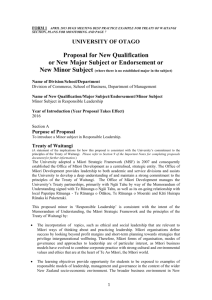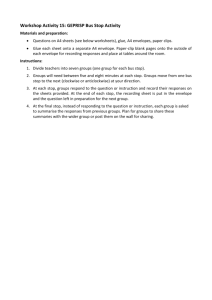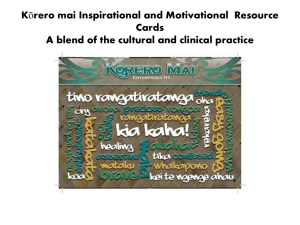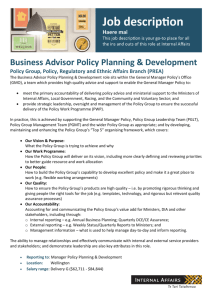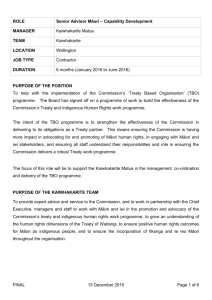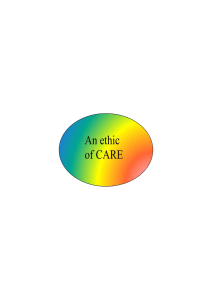Framework for Working Effectively with Māori
advertisement
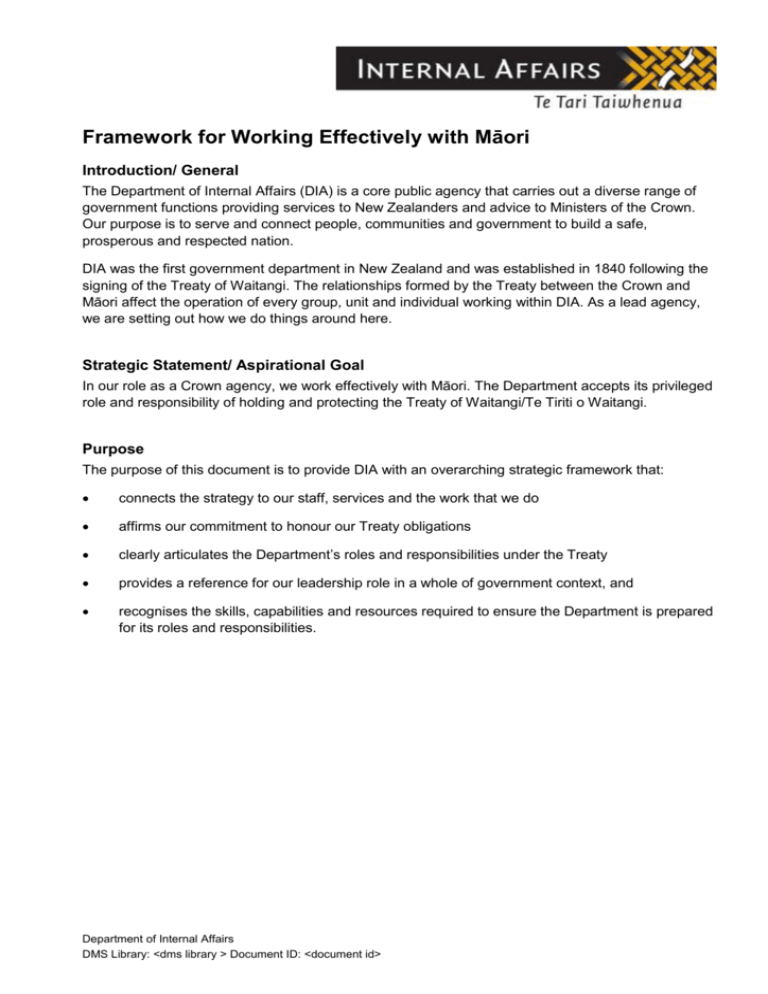
Framework for Working Effectively with Māori Introduction/ General The Department of Internal Affairs (DIA) is a core public agency that carries out a diverse range of government functions providing services to New Zealanders and advice to Ministers of the Crown. Our purpose is to serve and connect people, communities and government to build a safe, prosperous and respected nation. DIA was the first government department in New Zealand and was established in 1840 following the signing of the Treaty of Waitangi. The relationships formed by the Treaty between the Crown and Māori affect the operation of every group, unit and individual working within DIA. As a lead agency, we are setting out how we do things around here. Strategic Statement/ Aspirational Goal In our role as a Crown agency, we work effectively with Māori. The Department accepts its privileged role and responsibility of holding and protecting the Treaty of Waitangi/Te Tiriti o Waitangi. Purpose The purpose of this document is to provide DIA with an overarching strategic framework that: connects the strategy to our staff, services and the work that we do affirms our commitment to honour our Treaty obligations clearly articulates the Department’s roles and responsibilities under the Treaty provides a reference for our leadership role in a whole of government context, and recognises the skills, capabilities and resources required to ensure the Department is prepared for its roles and responsibilities. Department of Internal Affairs DMS Library: <dms library > Document ID: <document id> Roles and Responsibilities The Department’s roles and obligations under the Treaty include: Article One: Governance by the Crown (Kāwanatanga) DIA is a part of the Crown and acts as an agent of the Crown in its relationship with Iwi. DIA: 2 understands Treaty obligations and aspirations has respectful, enduring partnerships with Māori is the guardian of the Treaty documents supports settlement processes and delivers under settlement agreements recognises and responds to aspirations of Māori in the Iwi settlement process and postsettlement provides policy advice informed by Māori perspectives actively promotes crossgovernment work to support Māori. Article Two: Rights of Māori to have undisturbed possession of their taonga (Tino Rangatiratanga) Article Three: Full citizenship and human rights of Māori DIA recognises the rights of Māori, and understands the meaning of taonga for Māori. At DIA, this includes: DIA has a core responsibility to provide services for all New Zealanders. To effectively deliver services to Māori, DIA: genealogical information (eg, births, deaths and marriages records) Tikanga Te Reo understands the needs and expectations of Māori in relation to the services, ensuring recognition of Māori citizenship and civil and human rights protection and access of the Treaty documents and mātauranga Māori (eg, documentary heritage, taonga) develops relationships with Māori and a shared understanding of the way DIA can effectively deliver services to Māori creating resources that facilitate or enhance the ability of Iwi to exercise their rights. ensures all staff understand the needs and expectations of Māori and have skills, resources and competencies to engage effectively with Māori. Department of Internal Affairs DMS Library: <dms library > Document ID: <document id> Considerations for Implementation In performing the functions of the Department, we are mindful of and abide by the following considerations to help ensure our Treaty obligations are incorporated in how we work: Foundation Aspects 1. As the Department is an agent of the Crown, the Treaty of Waitangi is important to everything we say or do. We acknowledge both versions of the Treaty of Waitangi/Te Tiriti o Waitangi as imparting a unique dimension to New Zealand’s public service. The Crown's position on Treaty issues will direct our strategic and operational planning. 2. We recognise the Treaty as an enduring document central to New Zealand’s past, present and future. It underpins the legitimacy of the government. We are aware of the ongoing nature of our Treaty obligations and how relationships between the Crown and Māori will continue to evolve over time. The nature of relationships with Iwi in the settlement process for example, will change in the post-settlement environment. 3. Building and maintaining meaningful relationships is important to work effectively with Māori, stakeholders and other agencies. Strong relationships allow meaningful dialogue and demonstrate how our behaviours and words give effect to our strategies and policies. Implementation Aspects 4. To meet our Crown agency obligations, all staff have the required skill set to be competent in understanding the Treaty and its relevance in our workplace. We need to ensure we have the skills, resources, capability and competency to carry out our roles. 5. We will support and develop our Māori staff and acknowledge their special contribution to enrich how we work with Māori, and how we broaden our understanding and skills. 6. We accept that growing our competence and understanding will require an ongoing review of our approach. In this dynamic environment, our expectations about what is achievable and what is good practice in providing services to Māori will evolve. We will gather evidence and research to enhance our understanding of how best to deliver our roles and responsibilities, and as a result, our services and delivery may change. 7. We need to articulate the reasoning behind our policies and actions to explain how each relates to our strategy. By recording our understanding, we recognise the nature and intent of our enduring commitment to fulfil our Treaty obligations, while at the same time, allow our energy and focus to remain on implementation and improving outcomes. 8. As a Crown agency, our implementation planning will align with overall Government objectives and policies to ensure better outcomes for Māori and effective and efficient service delivery. We will identify and track our performance using measures that assess our progress towards strategic goals, objectives and outputs, and will evaluate the changes in outcomes for Māori as part of our annual planning process. Dated: 02 July 2013 Department of Internal Affairs DMS Library: [XXXXX] Document ID: [NNNNNNNN] 3

